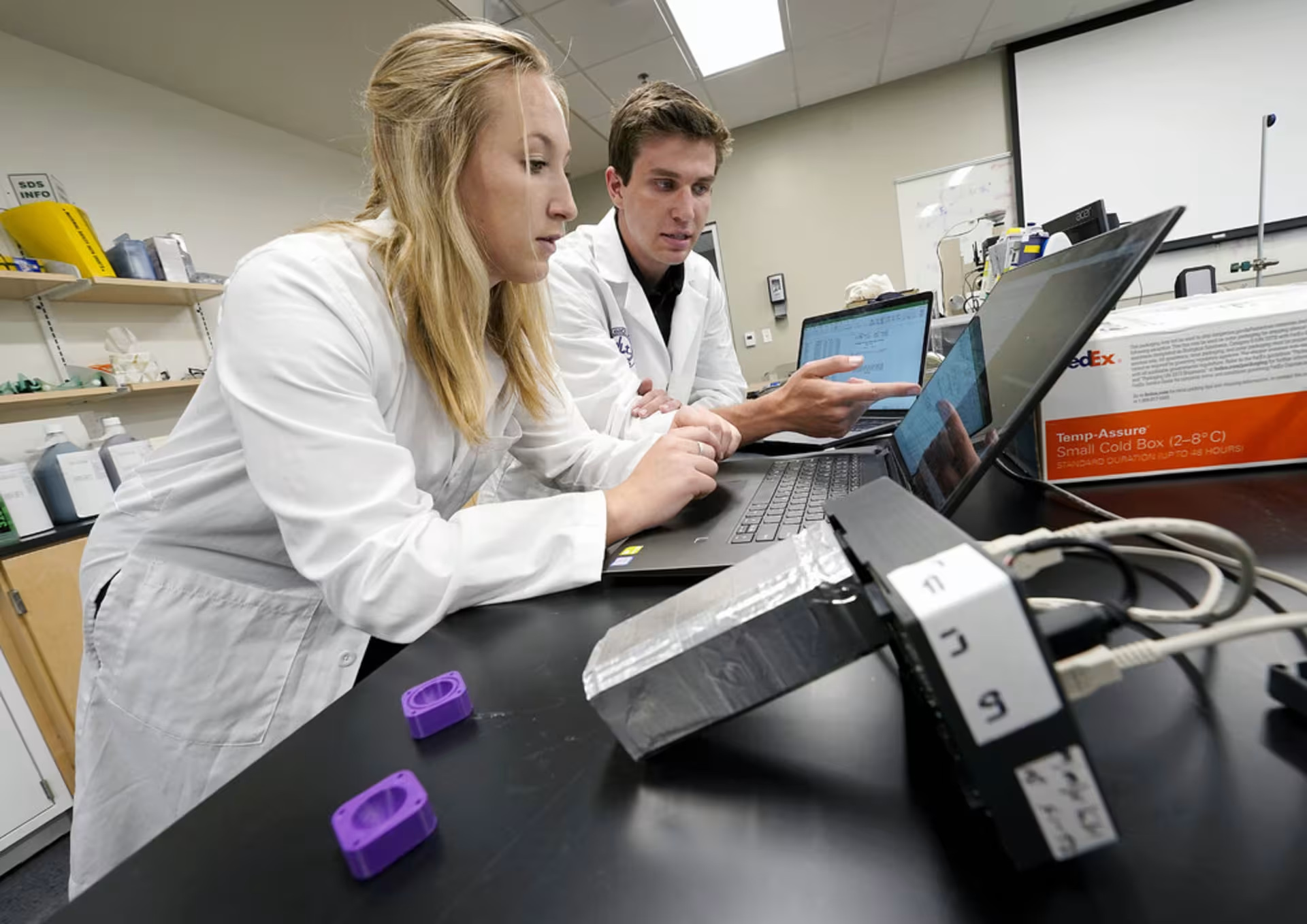
Master’s in Biology: Education Emphasis
Explore Your Passion for STEM Education
The Master of Science in Biology with an Emphasis in Education from Grand Canyon University is designed for students with biology backgrounds who are interested in pursuing careers in education. With a convenient online format, this degree program can prepare you to balance biology content with pedagogy and classroom techniques, effectively delivering advanced training in the field of biology education while satisfying the requirements for ongoing professional development.
You will be required to collaborate with many stakeholders, including students, colleagues and department leaders. Strong written and verbal communication skills are essential for both classroom engagement and ongoing scientific inquiry. The curriculum at GCU emphasizes the development of these crucial communication abilities and fosters essential skills for a career in postsecondary education, including critical thinking and collaboration.(See disclaimer 1)

Online: $615 per credit [More Info]
Up to 12 credits or 1/3 of the total program requirements in transfer (whichever is less)
Credits: Fill out the Lopes Eval to find out what will transfer
Admission Requirements (Master's)
- Undergraduate Degree*
- 2.8+ GPA
OR 2.5+ Unweighted GPA and
- GMAT: 500
- GRE: 300 combined**
Admission requirements may differ based on degree level, program and modality, or transfer status. Some programs of study may require a higher GPA and/or other qualifying criteria for admission. Please review full admission and program requirements in the University Policy Handbook.
* Degree must be from an accredited college or program that has been approved by GCU.
** Combined verbal/quantitative, after August 2011 (1,000 combined verbal and quantitative, prior to August 2011).

Choose GCU for Your Online Master’s Program
“Starting my online master’s program came very naturally to me. I felt supported. I knew if I needed help, I could get it from professors who were really involved and were always on the discussion forums trying to interact with the students.” - Chris Jennings, GCU Graduate, 2020
Earn Your Online Master’s in Biology
One benefit of earning your biology education degree at GCU is the ability to earn this master’s degree entirely online. This degree could be a good fit for working professionals, including those who are juggling personal and professional responsibilities. Knowledgeable instructors will support your academic growth as you prepare for a future career in postsecondary biology education. Courses in biology can be taken anytime from anywhere on GCU’s intuitive e-learning platform.
This Degree Is Offered Online
Expanding Your Expertise in Biology and Teaching
In this program, you have the potential to build on the biology background you already have, continuing your scientific exploration while being taught techniques to help you in the classroom. Both biology topics and teaching skills are at the heart of our master's degree in biology: education emphasis program.
You will have opportunities to delve into topics as far-ranging as antimicrobial control to effective instructional methods for both online and traditional instruction. A combination of digital classroom instruction and hands-on activities provides opportunities for you to experience academic growth as you prepare to pursue a career in postsecondary education.
Courses cover a range of topics designed to nurture a solid foundation of both biological competencies and pedagogy strategies, including:
Ecology
Biological systems (both cellular and molecular)
Physiology
Microbiology
Curriculum design
Adult learning theories
Prerequisite Requirements
This master’s degree exploring biology teaching methods has prerequisite requirements designed to help you achieve the necessary foundation of science competencies to work through the advanced curriculum.
You will need to meet one of the following prerequisites:
Teachers at the postsecondary level typically must have a doctoral degree in their field. However, a master’s degree may be accepted at community colleges.(See disclaimer 1)

The Growing Need for Biology Teachers
The College of Natural Sciences at GCU strives to thoroughly prepare future educators to confidently meet the need for STEM education in the U.S. The need for postsecondary teachers is on the rise. The U.S. Bureau of Labor Statistics Occupational Outlook Handbook estimates job growth for all types of postsecondary teachers to increase by about 8% from 2022 to 2032, faster than average, accounting for an estimated increase of 108,100 jobs in the field.(See disclaimer 2) This degree program is designed to provide you with the education you’ll need to prepare for a career in the field.
Future scientists, technologists, engineers and mathematicians will need to take biology at the college level. As STEM fields continue to grow, so too will the need for biology teachers. According to the BLS, biological science teachers are most highly concentrated in junior colleges.(See disclaimer 3 )This means that recent grads and people looking to start a second career will need quality biology teachers to help prepare them for the future.
Estimated number of new jobs for postsecondary teachers from 2022 to 2032(See disclaimer 2)
Career Opportunities in STEM Education
This non-licensure education emphasis degree is intended to help you prepare to pursue teaching opportunities in biology at the postsecondary level. Academic requirements for postsecondary educators can vary from one institution to the next. Generally, a master’s degree and some related work experience can be sufficient to apply to a teaching post at a community college.(See disclaimer 1) However, those who aspire to work in universities are advised to apply to a PhD program after earning this master’s degree.(See disclaimer 1)
If you are hoping to potentially advance your career by building on your biology background, teaching might be your next step. Join like-minded scientists who want to make a difference in education.
Earn Your Graduate Degree From an Institutionally Accredited University
At GCU, we prioritize education quality to prepare our graduates for the workplace and are proud to be institutionally accredited, reflecting our commitment to excellence. The Higher Learning Commission has continually accredited GCU since 1968. The College of Natural Sciences shares the university’s commitment to upholding the principles and standards established by our accrediting bodies.
Biology Education FAQs
GCU has compiled the following frequently asked questions and answers to help you plan for your graduate-level education and reflect on your career path.
What can I do with an MS in Biology Education emphasis degree?
Which degree is best for a biology teacher?
Is a master’s degree in biology worth it?
Program Curriculum
Core Courses

Blend your passion for biology and education with an advanced STEM degree.
- U.S. Bureau of Labor Statistics. (2024, April 17). How To Become a Postsecondary Teacher. Occupational Outlook Handbook. Retrieved July 11, 2024.
- COVID-19 has adversely affected the global economy and data from 2020 to 2022 may be atypical compared to prior years. Accordingly, data shown is effective September 2022, which can be found here: U.S. Bureau of Labor Statistics, Occupational Outlook Handbook, Postsecondary Teachers, retrieved on July 11, 2024.
- U.S. Bureau of Labor Statistics. (2021, March 31). Occupational Employment and Wages, May 2020: 25-1042 Biological Science Teachers, Postsecondary. Retrieved July 11, 2024.


